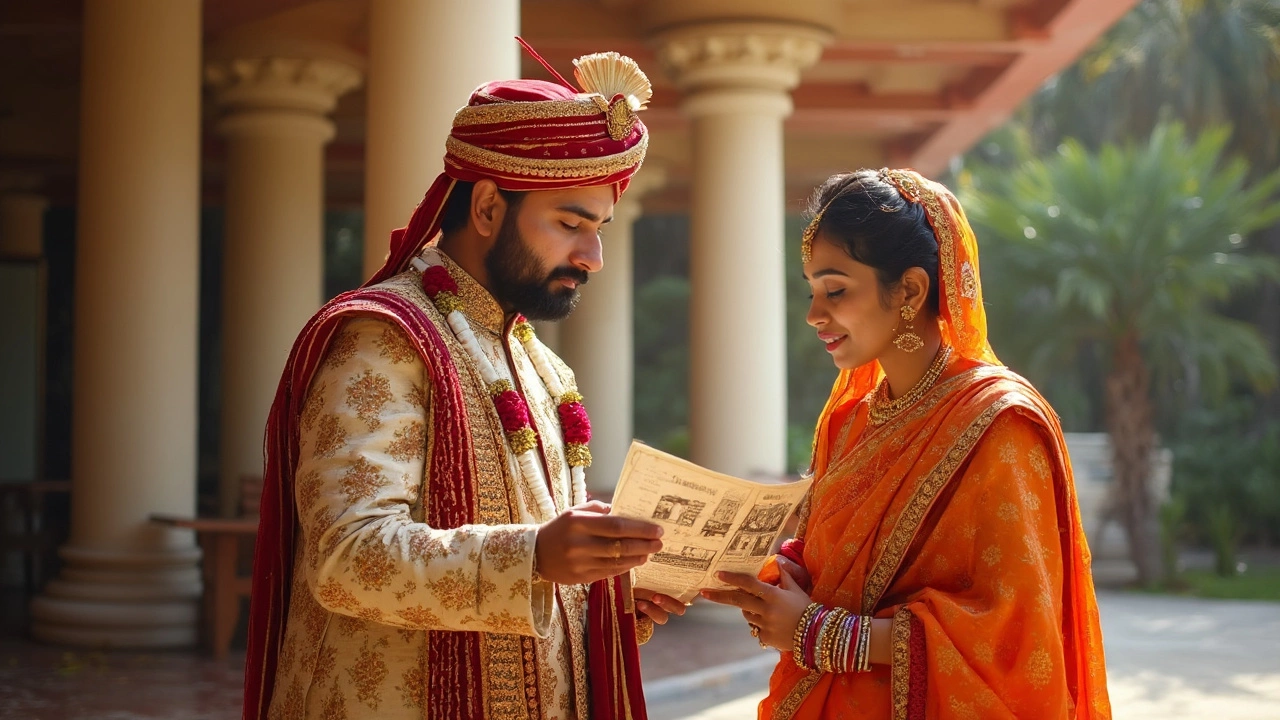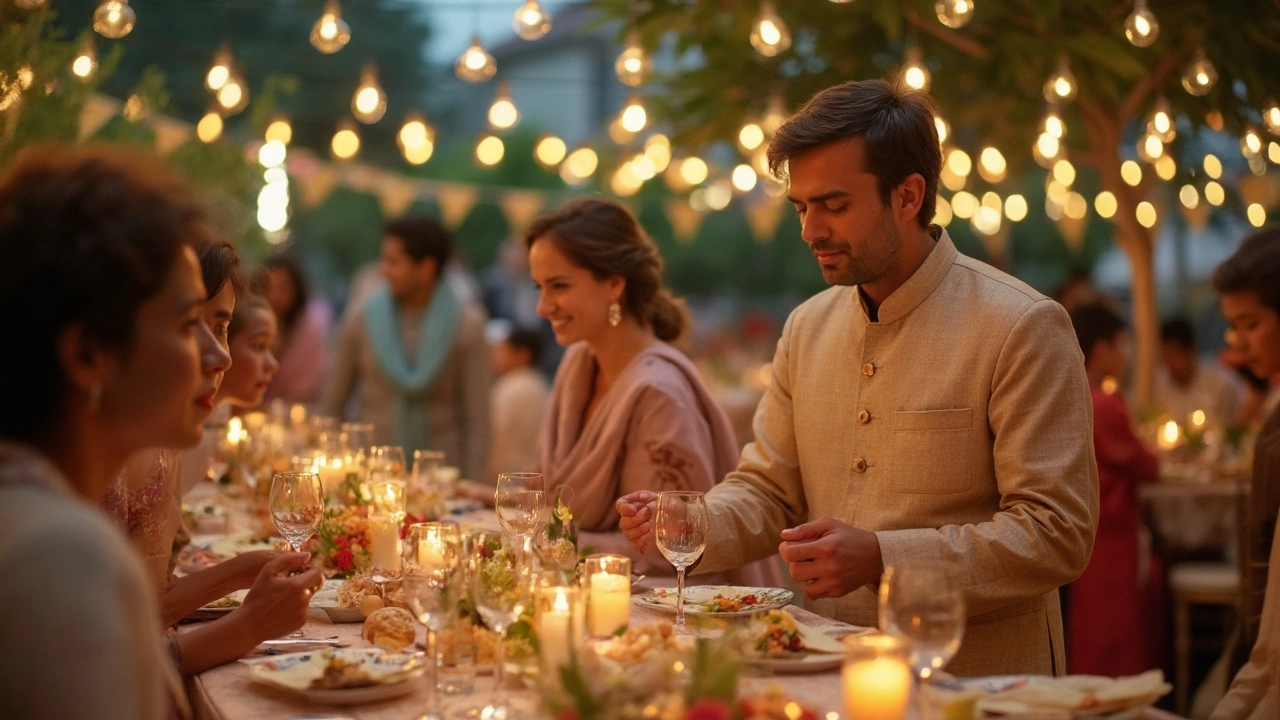
When it comes to weddings, navigating who-pays-for-what can be quite the dance. While we often hear about the bride's family covering the bulk of expenses, the groom's parents have their spots on the roster too. Traditionally, the groom’s side might not have been expected to tote as much of the financial load, but times are definitely changing.
Today's couples are rewriting the rules, and that means mom and dad on either side might chip in for the venue. The biggie is the rehearsal dinner, often a fun, intimate gathering the night before the main event. That's pretty much a staple for groom's parents to handle.
Of course, every family is different. So, deciding who covers what shouldn't be set in stone because the dynamic could be all over the map depending on family traditions, culture, and budget. In any case, having open, honest discussions can smooth out potential bumps when figuring out who'll foot parts of the bill.
- Traditional Responsibilities
- Modern Shifts in Roles
- Contributing to the Venue
- Rehearsal Dinner Duties
- Collaborative Decisions
- Tips for Financial Discussions
Traditional Responsibilities
Back in the day, wedding roles were almost script-like, with well-defined financial duties for both sides of the family. The bride's family picked up the big-ticket items like the wedding venue, catering, and the dress. But that didn't leave the groom's folks entirely off the hook.
Traditionally, the groom's family covered things like the rehearsal dinner, the marriage license, and the officiant's fees. Not only that, but they were also responsible for the groom's attire and sometimes even the honeymoon. While some might think these were lighter duties, they came with significant expenses too.
Classic Duties of the Groom's Family
- Rehearsal Dinner: This was and often still is a big social event handled by the groom's parents.
- Marriage License: It might seem small, but every wedding needs one.
- Officiant Fees: Ensuring the ceremony runs smoothly shouldn't be overlooked.
- Groom's Attire: Suits aren't cheap, you know!
- Honeymoon Costs: While not always mandatory, this was sometimes part of the parental duties.
These roles highlight respect and gratitude to both families, reinforcing bonds at an important time. But hey, it's 2025, and not every family sticks to this playbook anymore.
Modern Shifts in Roles
In the past, wedding bills were pretty clear-cut, but oh boy, things are changing fast. Today, the lines are blurrier, and the groom's parents are getting more involved in the planning and financing of wedding events. This evolution is usually linked to more inclusive ideas about money and partnerships in relationships.
Groom's parents are often taking on more than just the rehearsal dinner cost. From splitting the bill for that dreamy wedding venue to chipping in for the open bar, there’s a growing trend where families share the financial undertaking more equally.
Changing Traditions
Let’s look at the changing traditions. It's no longer just about who can pay more, but rather about how families can come together to create a special event. Sometimes, both sides like to sit down and decide which aspects each set of parents would like to handle. It’s not uncommon for the groom’s family to help out when the venue rental is a bit heftier than expected.
Statistical Snapshot
According to the Wedding Report in 2023, nearly 25% of groom's parents now contribute significantly to wedding budgets, compared to just 5% a decade ago. This reflects a broader cultural shift towards more balanced family contributions.
Ultimately, it's crucial for families to have open discussions to avoid misunderstandings. Couples should also feel free to suggest alternative setups if everyone's on board, ensuring every pivotal element of the day is covered without burdening one side.
So, whether it’s splitting costs down the middle or handling different elements independently, having a plan and flexibility is key. This modern approach benefits both families, making the entire process less stressful and a lot more enjoyable.
Contributing to the Venue
When we talk about weddings, the wedding venue often takes up a substantial part of the budget. Traditionally, the bride’s family might have been expected to cover this, but today’s weddings leave room for more flexibility. It’s not uncommon for the groom's parents to chip in, especially if they're eager to support a special location or theme that's close to the couple’s hearts.
In many modern settings, the families split venue costs right down the middle. This teamwork approach can ease the financial burden. Choosing whether to contribute depends largely on the family dynamics and budget. If the groom’s parents participate, they usually appreciate being involved early in the planning process to ensure the choice aligns with their contribution.
How to Decide Contribution
The first step in deciding contribution is open communication. It’s essential to sit down with all parties involved to discuss expectations and preferences. Some grooms' families might have a specific budget in mind, while others are more flexible.
- Budget Meetings: Have a clear, laid-back meeting where everyone shares their ideal budget and what they might prefer to spend on.
- Joint Inspections: Visit potential venues together. It’s a great chance for both families to bond over planning and make decisions as a team.
- Collaborative Planning: Encourage each side to share ideas on what a perfect venue looks like. Understanding each other's vision can help in selecting a place everyone loves.
In some cases, the groom’s family might take on a particular aspect of the venue, like covering the cost of extra amenities or specific setup needs. The idea here is to foster a spirit of collaboration, turning wedding planning into a cherished family milestone rather than a stress-inducing task.

Rehearsal Dinner Duties
One of the key roles that often falls to the groom’s parents is hosting the rehearsal dinner. Traditionally, this event takes place the night before the wedding, providing both families and the wedding party a chance to relax and rehearse for the big day. It's not just a dinner; it's a bonding moment.
Hosting the rehearsal dinner can vary widely, from a casual barbecue in someone's backyard to a fancy meal at a restaurant. The important thing is for it to reflect the style and vibe of the upcoming wedding, keeping everyone comfortable and ready to celebrate.
Planning the Guest List
The guest list usually includes close family, the bridal party, and any out-of-town guests who have traveled considerable distances. That's not a strict rule—some couples choose to keep it intimate, while others open it up to more guests.
Budgeting for the Dinner
Now, onto the nitty-gritty—budgeting. The groom’s parents should consider their budget when planning the rehearsal dinner. Costs can include the venue, food, drinks, and sometimes entertainment. A good rule of thumb is to allocate a portion of your wedding funds, keeping in mind the overall expenses for the wedding.
Theme and Décor
Choosing a theme or keeping things simple can guide decisions about food and décor. For instance, if the wedding’s taking place at a winter lodge, consider a cozy theme with warm, hearty dishes. The key is consistency, ensuring the dinner complements the main event without overshadowing it.
By fulfilling this role, the groom's parents essentially kick off the wedding festivities, allowing everyone to feel welcomed and appreciated. It's a great way to contribute without battling traditional expense norms and gives both sides of the family a chance to mingle before the whirlwind of the wedding day begins.
Collaborative Decisions
Gone are the days when wedding planning was a solo sport undertaken by the bride’s family. These days, it’s all about teamwork, making collaborative decisions a key part of the process. Whether you're planning a small backyard affair or a grand event at an upscale wedding venue, involving both families can make for a memorable journey.
First up, communication is crucial. Sit down together as a group, ideally with both sets of parents and the couple. Discuss expectations and desires honestly. It's important to let everyone voice any concerns or ideas they have about the venue and general costs. No one wants surprises later on.
With that, budgeting should be a team effort. Lay out who is comfortable contributing what. Maybe one family is better equipped to cover specific areas—like decorations or catering—while the other can handle the venue cost. It’s not uncommon now for the groom’s parents to step up with offers and input. Flexibility is key here.
Venue Visits Together
How about a little group bonding time with some venue tours? Visiting potential places as a family helps everyone visualize what the wedding will look like and narrows down choices. Plus, you'll all get a vibe check, see what's feasible, and who knows, maybe someone will spot a small detail that could be overlooked otherwise.
Crunching the Numbers
Getting practical with numbers can be a game changer. It's helpful to create a simple table or outline of expected costs and responsibilities. Here's a sample breakdown:
| Category | Bride's Family | Groom's Family | Couple |
|---|---|---|---|
| Venue | 50% | 30% | 20% |
| Catering | 60% | 20% | 20% |
| Entertainment | 40% | 40% | 20% |
This is, of course, just a sample scenario. The main thing is to have clarity on who covers what, reducing any chances of awkwardness later on. With groom's parents and the bride's family teaming up, the wedding journey turns into a delightful family collaboration!
Tips for Financial Discussions
Discussing wedding finances can sometimes feel like walking on eggshells, but it doesn't have to be! Here's how to keep things smooth and stress-free when talking about what the groom's parents might cover for the big day.
Start Early
Timing is everything. Bringing up finances well ahead of the wedding day gives everyone more room to breathe. Discussing early lets families align expectations about their roles in footing bills, especially for major items like the wedding venue.
Be Clear and Honest
No tiptoeing! Have transparent conversations about what each party can afford and is comfortable paying. This way, there are no surprises or last-minute scrambles.
Understand Each Other’s Viewpoint
Every family has its own traditions about who should pay for what. Understanding these dynamics can help during decisions. For instance, if the groom’s family traditionally covers the rehearsal dinner, let them take the reins confidently.
Set a Budget
Putting numbers down on paper helps visualize where the money will go. Create a budget that includes each family’s contributions. This doesn’t just keep expenses in check; it makes everyone feel valued and included.
Use a Team Approach
Think of it as teamwork. Couples and families can discuss ways to divide costs so that it feels fair. It could mean a 50/50 split on the venue or divvying up based on personal preferences and capacities.
| Item | Traditional Responsibility | Modern Approach |
|---|---|---|
| Venue | Bride's parents | Shared between families |
| Rehearsal Dinner | Groom’s parents | Groom’s parents or shared |
| Catering | Bride's parents | Couple or shared |
Remember, these are suggestions, not hard rules. The most important thing is the collaborative spirit and finding what's best for everyone involved.



Comments
Post Comment